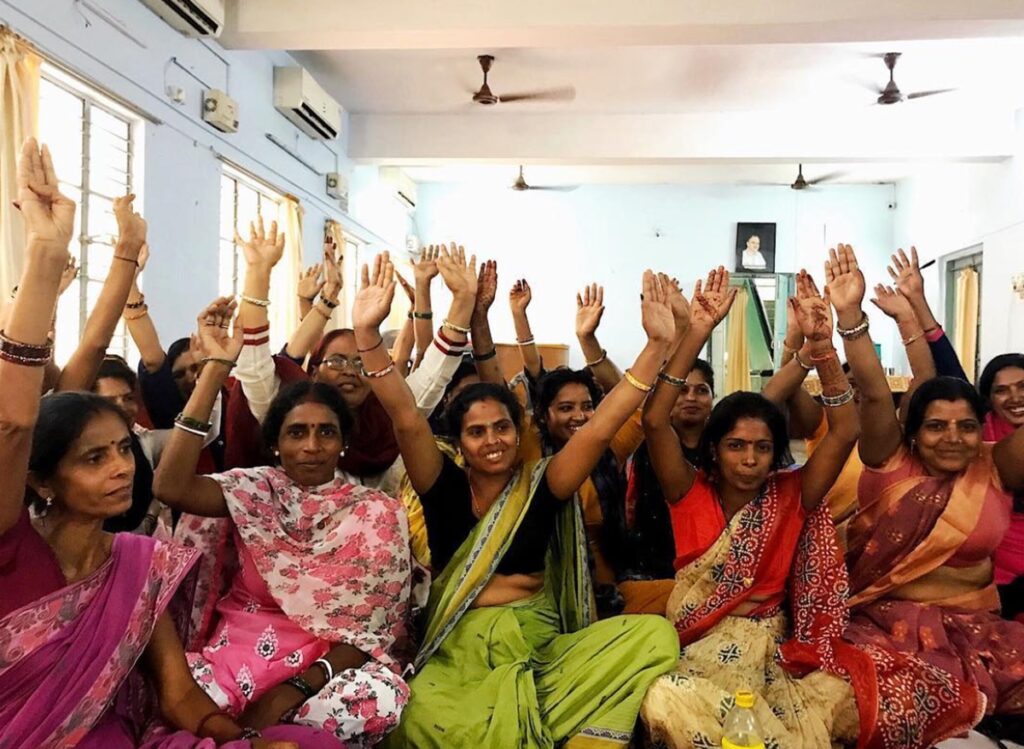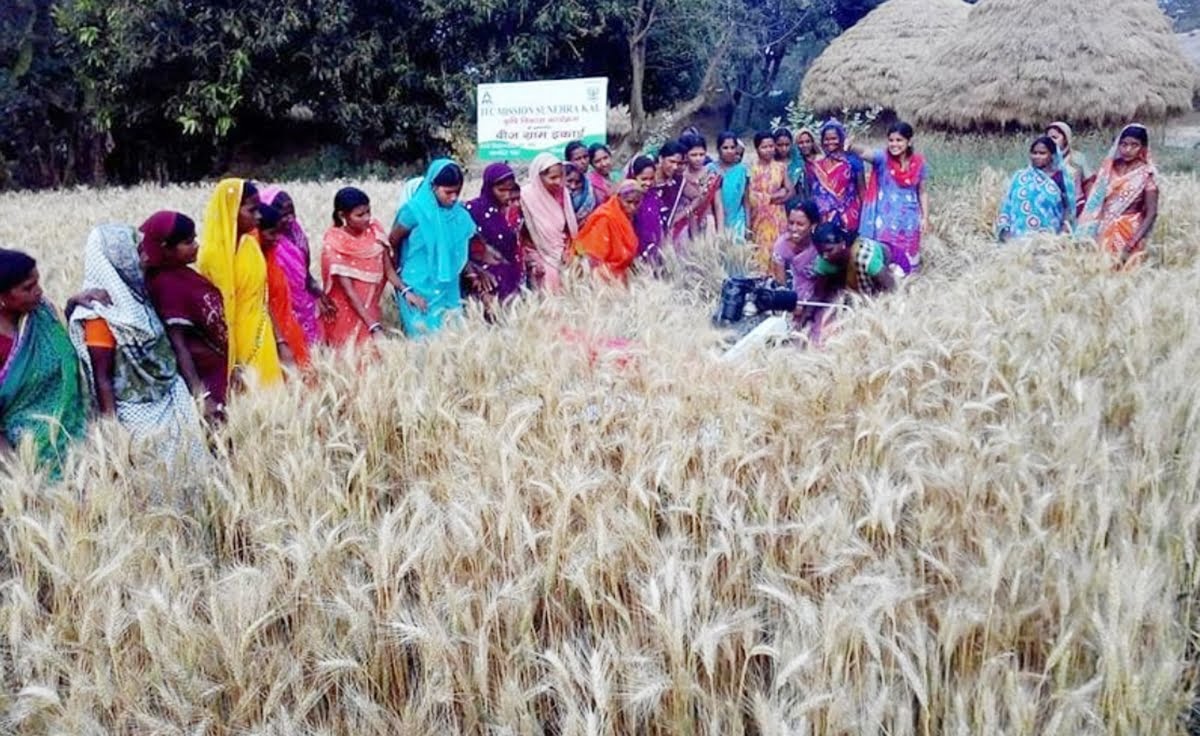Lataben is a tribal farmer from Gujarat’s Tapi district. She is also the president of a profitable agriculture cooperative — Megha Mandali, and co-owns it along with 1000 other tribal farmers in the district. “We are all women, and all farmers. By coming together in this cooperative, we are able to pool our resources and work together to procure certified seeds, tools and sell our produce in the market for good prices.”
Lataben is one of many informal women workers who has been organised by the Self-Employed Women’s Association (SEWA). In need for a sustainable means of livelihood, these women workers came forward to form enterprises of their own. For the past two years, SEWA Bharat and SEWA Cooperative Federation — have created the model of an Enterprise Support System (ESS) to enable Megha Mandali and other such collective enterprises, across sectors, in their journey to achieve full employment and self-reliance.
Women’s collective enterprises can take many forms: from cooperatives and SHGs/SHG federations to producer organisations and private limited companies. While their forms may vary, what defines these enterprises is collective ownership and collective decision-making by the worker-owners — a role often denied to women, and particularly to women in the informal economy.
Women’s collective enterprises can take many forms: from cooperatives and SHGs/SHG federations to producer organisations and private limited companies. While their forms may vary, what defines these enterprises is collective ownership and collective decision-making by the worker-owners — a role often denied to women, and particularly to women in the informal economy.
Also read: It’s Time Women Are Compensated For Their Unpaid Labour
A 2019 study by Azim Premji University suggests that only 20% of all enterprises in India are owned by women, out of which a majority are single-person owned, informal enterprises. Meanwhile, data on those owned collectively by women workers is not available.
These estimates are hardly surprising. The challenges faced by informal women workers and their enterprises are aplenty. Take the story of Jyotsnaben, who was pulled out of school early, so that she could contribute to the household income by helping her mother in domestic work. With little to no access to education, financial resources, and restricted mobility, she herself did not identify as a ‘worker’. Now for a second, imagine that Jyotsnaben manages to move past these hurdles and decides to become part of a collective enterprise. The next hurdle is to negotiate with public officials who would create another set of hurdles, such as: “Childcare is not work”, “what business will your enterprise do?” “We cannot register this”, etc. The task seems quite daunting at this point.
Nevertheless, imagine again that these hurdles are crossed and all there is to be done now is to actually ‘run the business’. But even then, the barriers to success continue.
Even when collectivised into enterprises, women-run businesses face more obstacles than those run by men, especially in accessing markets, arranging capital and skills/knowledge for running businesses. For example, the farmers of Karnabhumi, the only women-run, farmer-producer company (FPC) in Bihar, struggled to transport harvested produce to the market during the lockdown, despite it being an essential service because curfew passes were only issued to those who owned a vehicle. Unsurprisingly, the women didn’t own any, as household vehicles were in the name of the household’s male members.
This example links back to the question of financial access. Without this capital, or assets, women often struggle to get investments into their enterprises, since they often lack networks to raise capital — formal or informal. The pool of money from the shareholders is not enough, as share amounts are deliberately kept low to enable affordability.
Also read: The Kishori Shramik And The Labour Market
Finally, running a successful enterprise requires a certain set of skills and knowledge. Informal women workers have systematically been barred from accessing education, and have not been able to develop these skills by being limited to the household. This includes the knowledge of markets, accounting know-how, strategy and planning, as well as leadership has to be created nurtured, with focused and long-term capacity building.
These systemic, and oft-unrecognised barriers, make it important to create an ecosystem wider than the limited scope of traditional incubators and accelerators for startups. Women’s businesses need holistic Enterprise Support Systems (ESS), which are designed to cater to any problem women face while promoting and operating businesses. The ESS model is doing this by designing a model based on lessons over fifty years of promoting women-run collectives, and taking feedback from contemporary social enterprises incubators. It is structured as an in-depth support over three years, which matches businesses with sectoral experts as mentors, gives access to a team of professionals for support, provides unrestricted grant capital, and nurtures leadership and governance through a continuous capacity-building program.
The first cohort of this ESS model has eight SEWA member-run collective enterprises, across sectors, states and stages of growth. Initial work with them has revealed that any structured support amplifies, when the participating enterprises begin with community mobilisation and have women in leadership and governance roles. These core principles have to be matched with a recognition of the pace of work. Often, building sustainable, community-run institutions takes up to about ten years.

Even in two years, we have seen a change in these enterprises. They are swifter to react to market changes, as was evident during the pandemic when SEWA Ruaab, a women-owned artisans’ brand with over 160 grassroots women shareholders, began producing masks to cater to this market need, and Lok Swasthya Mandali (a health-sector cooperative of 1800 grassroots women workers) was able to quickly arrange working capital to begin production of hand sanitisers. They are also engaging with digital commerce, with the ESS advocating with both public (like the government e-marketplace) and private procurement platforms to become more conducive to the realities and needs of these enterprises, as well as women’s enterprises more generally. Since getting affiliated with the ESS, the enterprises have on an average seen a three times increase in revenue, despite COVID related losses.
In parallel to supporting existing enterprises, the ESS is also supporting incubation of newer businesses, especially those possible by training women in digital skills, or replication of successful business models to newer geographies. SEWA Sarvekshan was inspired by the possibility of gathering better qualitative data, when women from the community themselves can collect data through their smartphones, and apps which work offline and in their native languages. SEWA Atithi was built on the success of homestay businesses by our Gujarat and Munsiyari women-groups.
Through women’s collective enterprises, we can enable job growth and promote female labour force participation, which has been on a steady decline in India for the past few years.
The need for an enabling environment for these nano, micro women-owned enterprises is pressing. In a study (2020), by LEAD at Krea University, it was found that women’s enterprises were the hardest hit by the economic downturn caused by the pandemic, and 1 out of 3 of these enterprises either shut down temporarily or permanently. For these enterprises to survive an economic and social environment, which does not support or promote their growth, they need the backing of an ESS.
Research suggests that companies in the top quartile for gender diversity were 25% more likely to have above-average profitability than companies in the fourth quartile. Moreover, through women’s collective enterprises, we can enable job growth and promote female labour force participation, which has been on a steady decline in India for the past few years. Collective enterprises, run and owned by informal women workers, are sustainable, ethical, and resilient businesses, which can enable strong local economies and contribute to a more robust national economy.
Nitya Nangalia is a Coordinator at SEWA Bharat, leading the Enterprise Support System (ESS). In the past, she was a fellow with University of Chicago Trust’s IIC fellowship; she was a part of the setup team of PayTM Payments Bank, and has worked with PwC India. You can follow her on Twitter.
Salonie Muralidhara Hiriyur is a Senior Coordinator at SEWA Cooperative Federation. In the past, she has worked with IIM-A, International Labour Organisation (Geneva), and has a Masters in Gender and Development from the London School of Economics and Political Science. Her areas of interest include feminist economics, digital economies and platform cooperatives. You can follow her on Twitter.
SEWA Bharat is part of the national SEWA movement. SEWA Bharat emerged out of the need to address the SEWA movement’s challenges with geographical expansion and coordination. SEWA Bharat is comprised of a family of SEWA organizations to further informal women workers’ rights, livelihoods, financial independence, education, health, and social security. You can follow SEWA Bharat on Twitter, Instagram, YouTube and Facebook.
Featured image source: SEWA Bharat/Instagram




